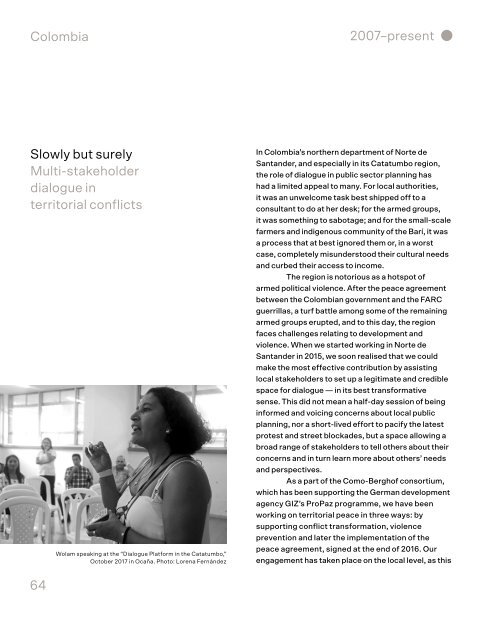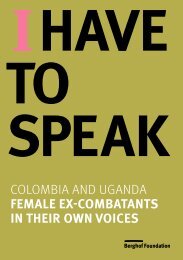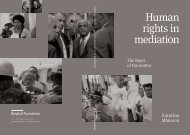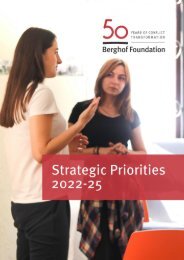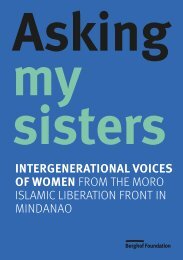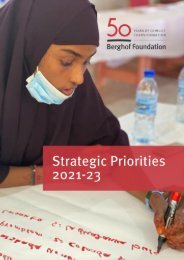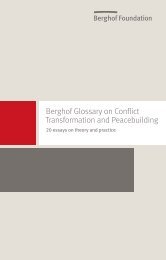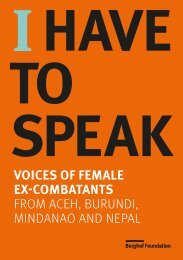Berghof Foundation: 50 years of conflict transformation
This book provides an overview of the Berghof Foundation’s work and impact over the past 50 years and sheds light on the challenges ahead of peacebuilding.
This book provides an overview of the Berghof Foundation’s work and impact over the past 50 years and sheds light on the challenges ahead of peacebuilding.
You also want an ePaper? Increase the reach of your titles
YUMPU automatically turns print PDFs into web optimized ePapers that Google loves.
Colombia<br />
2007–present<br />
Slowly but surely<br />
Multi-stakeholder<br />
dialogue in<br />
territorial <strong>conflict</strong>s<br />
Wolam speaking at the “Dialogue Platform in the Catatumbo,”<br />
October 2017 in Ocaña. Photo: Lorena Fernández<br />
In Colombia’s northern department <strong>of</strong> Norte de<br />
Santander, and especially in its Catatumbo region,<br />
the role <strong>of</strong> dialogue in public sector planning has<br />
had a limited appeal to many. For local authorities,<br />
it was an unwelcome task best shipped <strong>of</strong>f to a<br />
consultant to do at her desk; for the armed groups,<br />
it was something to sabotage; and for the small-scale<br />
farmers and indigenous community <strong>of</strong> the Barí, it was<br />
a process that at best ignored them or, in a worst<br />
case, completely misunderstood their cultural needs<br />
and curbed their access to income.<br />
The region is notorious as a hotspot <strong>of</strong><br />
armed political violence. After the peace agreement<br />
between the Colombian government and the FARC<br />
guerrillas, a turf battle among some <strong>of</strong> the remaining<br />
armed groups erupted, and to this day, the region<br />
faces challenges relating to development and<br />
violence. When we started working in Norte de<br />
Santander in 2015, we soon realised that we could<br />
make the most effective contribution by assisting<br />
local stakeholders to set up a legitimate and credible<br />
space for dialogue — in its best transformative<br />
sense. This did not mean a half-day session <strong>of</strong> being<br />
informed and voicing concerns about local public<br />
planning, nor a short-lived effort to pacify the latest<br />
protest and street blockades, but a space allowing a<br />
broad range <strong>of</strong> stakeholders to tell others about their<br />
concerns and in turn learn more about others’ needs<br />
and perspectives.<br />
As a part <strong>of</strong> the Como-<strong>Bergh<strong>of</strong></strong> consortium,<br />
which has been supporting the German development<br />
agency GIZ’s ProPaz programme, we have been<br />
working on territorial peace in three ways: by<br />
supporting <strong>conflict</strong> <strong>transformation</strong>, violence<br />
prevention and later the implementation <strong>of</strong> the<br />
peace agreement, signed at the end <strong>of</strong> 2016. Our<br />
engagement has taken place on the local level, as this<br />
example shows, but also on the departmental and<br />
national level, where policies on dialogue and peace<br />
have been developed, allowing these spheres to<br />
better inform each other and create synergies.<br />
As is <strong>of</strong>ten the case, much invisible<br />
groundwork needed to be done before the team took<br />
visible action, in order to avoid putting actors at risk,<br />
leaving some out, or being instrumentalised. After<br />
much trust-building and analysis, our entry point was<br />
an academic course on regional development run by<br />
the Socio-Economic and Environmental Observatory<br />
in the Catatumbo Region (OSEARC) <strong>of</strong> the regional<br />
university, where our advisor José Abad held a<br />
course on ‘Do No Harm’. The participants concluded<br />
that their different visions on the development<br />
<strong>of</strong> their region reflected the diversity <strong>of</strong> their<br />
interpretations and perspectives, and recognized<br />
that they <strong>of</strong>ten discarded others’ views without<br />
really knowing them. Building on the initial curiosity<br />
to learn about each other’s needs, we continued to<br />
engage with the participants, including small-scale<br />
farmers with diverse and <strong>conflict</strong>ing political views,<br />
local political representatives <strong>of</strong>ten closely linked<br />
to traditional powers, the Catholic Church, and<br />
pr<strong>of</strong>essors and students from the regional university.<br />
When José first engaged with all the<br />
various stakeholders, the peace negotiations were<br />
still ongoing. In line with the values and principles<br />
underlying all our work, he reiterated that his role<br />
was not to decide on issues or curb anyone’s political<br />
action, but to facilitate a space with a few simple<br />
rules that would enable all participants to engage<br />
in conversations in order to bring about mutual<br />
understanding.<br />
In the meetings, facilitated by José<br />
together with the team <strong>of</strong> the local observatory for<br />
environmental <strong>conflict</strong>s, confidence in the usefulness<br />
<strong>of</strong> the new way <strong>of</strong> engaging increased, enabling some<br />
unlikely alliances to emerge. For example, the Barí<br />
and the small-scale farmer-settlers, historically at<br />
odds over land use in the Barí’s territory, discovered<br />
that their needs were not necessarily contradictory,<br />
and that the government bore much <strong>of</strong> the<br />
responsibility for addressing their shared demands.<br />
Supporting a local team by continually<br />
building capacity was a good way <strong>of</strong> using our own<br />
role and catalysing change as an external actor,<br />
especially when aiming to create conditions to<br />
sustain this change after our project ends. Once the<br />
local team emerged as a credible actor and received<br />
a mandate from all stakeholders to facilitate this<br />
sort <strong>of</strong> exchange in the future, we focused on their<br />
capacities for multi-stakeholder dialogue. That<br />
process went well beyond training and advice, and<br />
covered teambuilding, facilitation training and<br />
support, as well as an organisational development<br />
component to bolster efforts aimed at supporting<br />
rural reform and local development planning.<br />
By 2020, despite Covid-19 restrictions<br />
affecting the local participatory planning processes,<br />
convivencia (living together) agreements between<br />
the Barí and the settlers have consolidated, and<br />
their organisations have defined joint positions<br />
vis-à-vis the national government around the<br />
issue <strong>of</strong> expanding the Barí reserve and creating a<br />
reserve for the farmer-settlers. Through a regional<br />
transformative dialogue, they have established<br />
alternative forms <strong>of</strong> dealing with <strong>conflict</strong>s and have<br />
managed to transform what had formerly divided<br />
them into a joint plan.<br />
64<br />
65


